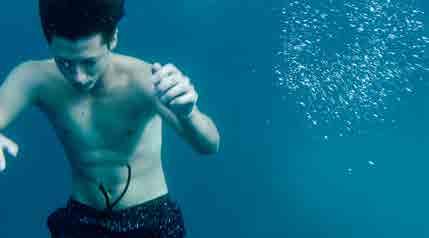
45 minute read
WETTBEWERB SPIELFILM FEATURE FILM COMPETITION
KATALOG FESTIVAL WETTBEWERB SPIELFILM FEATURE FILM COMPETITION WETTBEWERB SPIELFILM FEATURE FILM COMPETITION WETTBEWERB SPIELFILM FEATURE FILM
Die Heldinnen und Helden beziehungsweise Antiheldinnen und Antihelden des diesjährigen Spielfilmwettbewerbs – gezeigt werden zwölf Filme aus 17 Produktionsländern, wovon alle deutsche, zwei internationale und zwei Welturaufführungen sind – stehen einmal mehr vor ungewöhnlichen Herausforderungen, für die sich entsprechend ungewöhnliche Lösungen finden lassen müssen. Die emotionalen Aufs und Abs im Alltag verdichten sich nicht selten zu einer knallharten Realität, die zuweilen ins Surreale abdriftet. Sich hier durchzuboxen, ist nicht einfach, aber es ist möglich. Und auch, dabei die Würde zu bewahren und die damit verbundene Zwischenmenschlichkeit. Ob während der Hundstage in Belgrad, in der Einsamkeit des Nordpolarmeeres, unter dem Druck korrupter Kollegen, dogmatischer Glaubensbrüder oder den Zeitläufen der Gentrifizierung – die Wettbewerbsfilme der in diesem Jahrgang auffällig vielen jungen Regisseure und Regisseurinnen sprechen die Sollbruchstellen der Gesellschaft direkt an, bringen Gegensätze erst auf den Punkt und verknüpfen sie dann miteinander. Und finden dabei, zwischen Polit-Thriller und Buddy-Movie, Sitcom und Science-Fiction, besten Freunden und ziemlich verfeindeten Brüdern, abgehängter Provinz und „Schöner Wohnen“, zu einem bodenständigen Tatendrang – neugierig, befreiend und unterhaltsam. BB
Advertisement
The heroes and heroines, as well as the anti-heroes and -heroines of this year’s Feature Film Competition, featured across a total of twelve films from 17 producing countries, all of which will feature on German cinema screens for the first time, not to mention two international and two world premiere screenings, are once again faced with unusual challenges to which they are required to find correspondingly unconventional solutions. The emotional ups and downs of everyday life often condense into a hard-hitting reality that, at times, can border on the absurd. In such situations it’s not easy to stay afloat and yet it’s possible, and the same goes for maintaining one’s dignity and the humaneness that comes with it. Whether set to a backdrop of the dog days of summer in Belgrade, the solitude of the Arctic Ocean or pressure, be it from corrupt colleagues, dogmatic fellow believers or the passing of time under gentrification, this year’s featured films, the works of an unusually high number of up-andcoming directors, refuse to hold back in broaching society’s fault lines, giving expression to contradictions before proceeding to interweave them into a single narrative. Ranging from political thrillers to buddy movies, sitcom to science fiction, best of friends to sworn enemies and the remote provinces to “Ideal Home” the end result is always a down-to-earth energy that is at once curious, liberating and entertaining. BB
CUT IT OUT FILME GEGEN ZENSUR
Im Rahmen des Projekts „Cut it out – Filme gegen Zensur“ hat das Goethe-Institut in Zusammenarbeit mit arte und Berlinale-Shorts 20 renommierte Regisseure beauftragt, 45-sekündige Clips zum Thema Zensur zu produzieren, darunter auch einige osteuropäische Filmemacher wie Benedek Fliegauf, Radu Jude, Nikolai Nasedkin und Jasmila Zbanić. Die Filme setzen ein sichtbares Zeichen der Solidarität mit den Menschen in all jenen Ländern, in denen die Meinungsfreiheit eingeschränkt ist. Sie wollen auf die Gefahr von Zensur aufmerksam machen, die auch vorgeblich liberale Gesellschaften bedroht.
Die Regisseure des Projekts kommen aus Angola, Bosnien & Herzegowina, Brasilien, China, Deutschland, Georgien, Großbritannien, Indonesien, Israel, Österreich, den Philippinen, Polen, Rumänien, Russland, Thailand, der Tschechien Republik, der Türkei, Ungarn, den USA und Vietnam.
Mehr Informationen und alle Filme sind auf der Website des Goethe-Instituts zu finden: https://www.goethe.de/de/kul/flm/prk/ cup.html
Das FilmFestival Cottbus zeigt eine Auswahl der Kurzfilme jeweils vor den Filmen aus der Sektion des WETTBEWERB SPIELFILM.
TEMUR BUTIKASHVILI, GE 2018, 1 MIN BENEDEK FLIEGAUF, HU 2018, 1 MIN GERAÇÃO 80, AO 2018, 1 MIN RADU JUDE, RO 2019, 1 MIN AVI MOGRABI, IL 2018, 1 MIN NIKOLAI NASEDKIN, RU 2018, 1 MIN J. P. SNIADECKI, USA 2018, 1 MIN HAIM SOKOL, RU 2018, 1 MIN PETR VACLAV, FR/CZ 2018, 1 MIN WANG WO, CN/USA 2018, 1 MIN PIOTR WYSOCKI, PL 2018, 1 MIN JASMILA ZBANIĆ, BA 2018, 1 MIN
CUT IT OUT FILMS AGAINST CENSORSHIP
Within the framework of the “Cut It Out – Films Against Censorship” project the Goethe-Institut, in collaboration with arte and Berlinale-Shorts, tasked twenty renowned directors with producing 45-second clips on the topic of censorship. These included East European filmmakers such as Benedek Fliegauf, Radu Jude, Nikolai Nasedkin and Jasmila Zbanić. The films are a visible sign of solidarity with the people of all those countries where freedom of expression is restricted and furthermore seek to draw attention to the general dangers of censorship, which also has the potential to threaten liberal societies.
The directors of the project come from Angola, Austria, Bosnia & Herzegovina, Brazil, China, the Czech Republic, Georgia, Germany, Great Britain, Hungary, Indonesia, Israel, the Philippines, Poland, Romania, Russia, Thailand, Turkey, the USA and Vietnam.
More information on the project, as well as all films, can be found on the website of the Goethe-Institut: https://www.goethe.de/en/kul/flm/prk/cup.html?wt_sc=cutitoutshorts
The FilmFestival Cottbus will show a selection of these short films before this year‘s FEATURE FILM COMPETITION screenings.
GLAS DIE STIMME THE VOICE
OGNJEN SVILIČIĆ / KROATIEN, SERBIEN, NORDMAZEDONIEN / CROATIA, SERBIA, NORTH MACEDONIA, 2019, 76 MIN
Weil seine Mutter ihren mehrmonatigen Dienst auf einem Kreuzfahrtschiff antritt, muss der 17-jährige Goran auf ein Internat. Die Wahl fällt auf ein freundliches katholisches Gymnasium im dalmatinischen Hinterland. Doch Goran ist nicht gläubig, schnell fühlt er sich unter Druck gesetzt und wird zum Außenseiter. With his mother due to set out for several months‘ service on a cruise ship, seventeen-year-old Goran has no choice but to attend a boarding school. The family ends up choosing a Catholic grammar school in the Dalmatian hinterlands. Goran however is not religious and, feeling pressurised, soon ends up an outsider.
Spätestens als Goran in einer Theaterprobe die Legende von der unbefleckten Empfängnis als „Unsinn“ bezeichnet, gerät er mit der Internatsleitung in Konflikt. Da tuscheln seine Mitschüler bereits über den Neuen, der vor dem Mittagessen nicht beten will – ist er gar Muslim? In Goran wächst die Wut – auf die Doppelmoral seiner Zimmerkameraden, die heimlich Pornohefte lesen, aber laut über Enthaltsamkeit reden; auf sich selber; auf die Lehrerschaft, die die Jugendlichen darauf drängt, nicht vom rechten Weg abzukommen. Konformität, subtil erzwungen, gilt hier als Selbstverständlichkeit. Der treibhausartige Druck des missionarischen Eifers vollzieht sich mit fröhlichen Gospelgesängen statt mit barocken Strafpredigten, in moderner, lichtdurchfluteter Architektur statt düsteren Kreuzgängen. Im Zentrum von Ognjen Sviličićs viertem Spielfilm steht nicht das Dogma, sondern die banale Normalität, mit der es von der Mehrheit geteilt wird. Mit teilnehmender Beobachtung wird Gorans Weg in die ungewollte Rebellion seziert. Einer, der zwar nicht weiß, was er will, dafür aber genau, was er nicht will. Oder ist er vielleicht doch nicht der einzige Andersdenker? BB
Conflict with the school management proves unavoidable when, during a drama rehearsal, he describes the legend of Immaculate Conception as “nonsense”. His classmates start to talk behind the back of this newcomer who refuses to pray before meals: could he possibly be a Muslim? Goran grows angrier by the day: at the double standards of his roommates, who secretly read pornographic magazines and yet praise the virtues of abstinence, at himself, and also at the teachers who urge the youths not to go astray. Conformity, subtly enforced, is regarded here as a matter of course. The hothouse-like pressure of missionary zeal is carried out by means of joyous gospel songs instead of baroque sermons, to a backdrop of modern architecture suffused with light as opposed to gloomy cloisters. The centrepiece of Ognjen Sviličić‘s fourth feature film is formed not by dogma but instead the banal normality with which it is shared by the majority. Goran‘s reluctant path towards rebellion is dissected with empathetic observation. He is a person who, though unaware of what he wants, knows exactly what he does not want. Or is he perhaps not the only nonconformist? BB
Ognjen Sviličić — geboren 1971 in Split, Kroatien. Er studierte Regie an der Akademie der Darstellenden Künste in Zagreb, wo er heute als Professor lehrt. Seit 1991 entstanden unter seiner Regie international erfolgreiche Spiel-, Kurz- und Fernsehfilme. Seit 1998 schreibt er auch Drehbücher. Sviličić, ein alter Bekannter des FFC, lebt und arbeitet in Zagreb. — born in 1971 in Split, Croatia. He studied directing at the Academy of Dramatic Arts in Zagreb, where he now teaches as a professor. Since 1991 he has directed internationally successful feature, short and television films. Since 1998 he has also been writing screenplays. Sviličić, an old acquaintance of the FFC, lives and works in Zagreb. Filme SORRY FOR KUNG FU (2005) I WISH I WERE A SHARK (2001) ARMIN (2007, FFC 2007) TWO SUNNY DAYS (2010, FFC 2010) THESE ARE THE RULES (2014, FFC 2014) WETTBEWERB SPIELFILM
Filmformat / Format DCP | Farbe / colour Drehbuch / Script Ognjen Sviličić Kamera / Photography Marinko Marinkić Ton / Sound Igor Popovski Schnitt / Editing Nataša Pantic Musik / Music Tomislav Mihaljevic Ausstattung / Set Design Ivana Skrabalo Darsteller / Cast Franko Jakovcevic, Belma Salkunic Produzent / Producer Damir Teresak Produktion / Production Maxima film Co-Produktion / Co-Production Skopje film studio, Biberche Kontakt / Contact Maxima film Damir Teresak info@maxima-film.hr Tel: +38513647700 Mobile: +38598289559 Bozidara Adzije 22 10000 Zagreb Croatia
GORI DAS SCHWEIN PIG
GIGA LIKLIKADZE / GEORGIEN / GEORGIA, 2019, 81 MIN
Georgien: Sehnsuchtsland vieler Reisender mit Landschaften wie aus dem Bilderbuch. Doch abseits der Touristenströme herrschen oft Einöde, Arbeitslosigkeit und Armut. Regisseur Giga Liklikadze zeigt in seinem Spielfilmdebüt ein Leben in Lethargie – abseits von Schönwetter-Fotos und bunter Folklore. Georgia, the promised land for many travellers thanks to its stunning landscapes. And yet beyond the tourist-trail life is dominated by isolation, unemployment and poverty. In this, his feature film debut, director Giga Liklikadze turns the spotlight on to the lethargic lifestyle led by the majority far removed from the picture-book photography and folk legends.
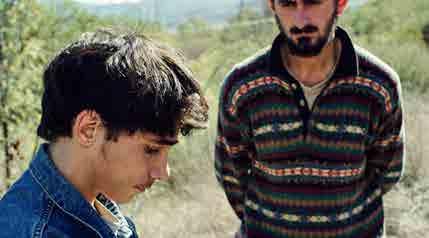
Giga Liklikadze — geboren 1985, in Georgien. Von 2003 bis 2009 studierte er an der Tbilisi Film School. PIG ist sein Spielfilmdebüt. — born in 1985, in Georgia. From 2003 to 2009 he studied at the Tbilisi Film School. PIG is his feature film debut. Filme MYTH (2007, exper) UNKNOWN SOLDIER (2011, short)
Für den Militärdienst nicht geeignet, streift Bachana ziellos umher – und landet nach einer Autobus-Panne direkt auf dem Grundstück zweier Kleinkrimineller. Die wollen von seiner Familie umgerechnet 100 Euro haben, damit sie ihn wieder laufen lassen. In der Zwischenzeit wird der 20-Jährige in dem heruntergekommenen Haus angekettet und schikaniert. Der eine bietet ihm Wasser an, der andere verweigert es. Mal gibt es Brot, dann wieder Schläge. Mal wird der Gefangene angeschrien, dann wieder kommt man ins Gespräch – irgendwo teilen Geisel und Geiselnehmer dieselbe Perspektivlosigkeit. Was als nächstes passiert? Unberechenbar. Bis die Oma der zwei Kleinkriminellen ihren Besuch ankündigt und das Haus aufgeräumt werden muss. Der georgische Autor und Regisseur Giga Liklikadze legt mit DAS SCHWEIN einen Finger in die Wunde: Nicht alle Georgier profitieren vom Tourismus und der Landwirtschaft, vielmehr werden sie von der Gesellschaft abgehängt. Minutiös und detailliert holt Liklikadze das ins Bild. In aller Seelenruhe studiert er Bachanas Ausharren, seinen leeren Blick. Auch nach Verlassen dieses Irrwegs geht seine Odyssee weiter, ein Ausweg ist nicht in Sicht. NaF Considered unsuitable for military service, Bachana wanders aimlessly and eventually, when his bus home breaks down, ends up on a plot of land which belongs to two petty criminals. The pair, in turn, demand one hundred Euros from the youngster‘s family before they let him free. In the meantime, the twenty-year-old is chained up and tormented in the dilapidated house. One of the kidnappers is willing to give him water, the other refuses. At times he‘s given bread, only for his guardians to once again resort to violence. In the discussions that intersperse the verbal abuse it nevertheless turns out that hostage and takers share the same insecurity vis-à-vis their future prospects. An unpredictable situation, that is until the pair‘s grandmother announces her intention to pay them a visit and the house has to be cleaned up. In PIG Georgian author and director Giga Liklikadze touches upon what is, for many Georgians, a harsh reality: unable to profit either from tourism or agriculture, they are left to fend for themselves. Captured meticulously, the film calmly reflects on Bachana‘s endurance and his empty gaze. Ultimately there is no end in sight, with the protagonist‘s ultimate release not putting an end to his odyssey. NaF
Filmformat / Format DCP | Farbe / colour Drehbuch / Script Giga Liklikadze Kamera / Photography Shalva Sokurashvili Ton / Sound Nika Paniashvili Schnitt / Editing Nodar Nozadze Ausstattung / Set Design Kakhaber Berelidze Darsteller / Cast Malkhaz Khutsishvili, Nika Gozalovi, Temo Goginava Produzent / Producer Giga Liklikadze, Irakli Chikvaidze Produktion / Production Sarke Studio Kontakt / Contact Giga Liklikadze gigaliklikadze21@gmail.com +995 599130790
JESTEM REN ICH BIN REN I AM REN
PIOTR RYCZKO / POLEN / POLAND, 2019, 75 MIN
Das Glück der Liebe ist ein äußerst seltenes und leicht zerbrechliches Gut. Besonders schwer hat es das Glück, wenn sich in den Alltag Kräfte einmischen, deren Herkunft nicht genau lokalisierbar ist. Plötzlich wird alles, was bisher für selbstverständlich erachtet wurde, in Frage gestellt – sogar die eigene Identität. Blissful love is an extremely rare and fragile asset. It has a particularly difficult time when forces whose origins cannot be pinpointed precisely then interfere in everyday life. Suddenly, everything that was previously taken for granted is called into question - even one‘s own identity.
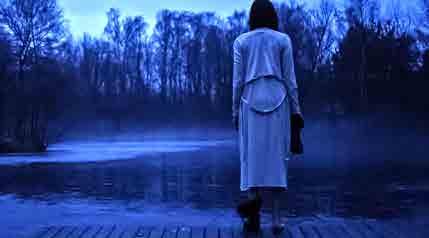
Piotr Ryczko — geboren in Polen und aufgewachsen in Norwegen. Er studierte Regie an der National Film School in Łódż und an der Wajda Film School. Ryczko ist außerdem Autor und Blogger. Seine Bücher und Geschichten sind oft Grundlage für seine Filme. So auch für sein Spielfilmdebüt ICH BIN REN. — born in Poland and raised in Norway. He studied directing at the National Film School in Łódż and at the Wajda Film School. Ryczko is also an author and blogger. His books and stories are often the basis for his films. This is also the case for his feature film debut I AM REN. Filme MILA (2003, short) BELOW THE SILENCE (2008, short) SPRINTER (2008, short) MONSTER (2012, short) WETTBEWERB SPIELFILM
Wer bin ich? Renata ist Mutter und Ehefrau. Sie und Jan sind glücklich verliebt. Der gemeinsame Sohn Kamil komplettiert das Familienglück. Bis das Programm „Glück“ infiziert wird. Von einem Tag auf den anderen wird die scheinbar heile Welt aus der Bahn geworfen. Renata muss sich unweigerlich mit der Frage nach der eigenen Identität und Echtheit beschäftigen. Ist sie die, für die sie sich immer gehalten hat? Oder doch ein REN, ein Regenerative Emotive Neuro-Being? Die Fragen überwerfen sich: Sind die gehörten Stimmen die eigenen Gedanken oder Kräfte von außen? Ist das, was ich sehe real oder nur ein trügerisches Bild der manipulierten Wahrnehmung? Stehen meine Liebsten an meiner Seite, oder sind sie nur die Handlanger eines Systems? Die Service-Agentur hat eine Fehlfunktion festgestellt, Renata droht die Abstellung. Noch ist Hoffnung da, doch ist die Familientherapie nicht schon finaler Besuch beim Techniker? Das dystopische Psycho-Drama balanciert geschickt zwischen Horror und Science-Fiction und versetzt den Zuschauer in eine Welt, in der er selbst allmählich den Boden unter den Füssen verliert. KM Who am I? Renata is a mother and wife. She and Jan are happily in love. Their son Kamil completes the family bliss. Until the „Happiness“ programme is infected. From one day to the next, the seemingly intact world is thrown off track. Renata inevitably has to deal with the question of her own identity and authenticity. Is she the person she always thought she was? Or is she a REN, a Regenerative Emotive Neuro-Being? The questions come thick and fast: are the voices she hears her own thoughts or forces from outside? Is what I see real or just a deceptive image of manipulated perception? Are my loved ones standing by my side or are they just the henchmen of a system? The service agency has detected a malfunction, Renata is threatened with shutdown. There is still hope, but isn‘t the family therapy already the final visit to the technician? The dystopian psychological drama cleverly balances between horror and science fiction and transports the viewers into a world where they themselves gradually lose the ground beneath their feet. KM
Filmformat / Format DCP | Farbe / colour Drehbuch / Script Piotr Ryczko Kamera / Photography Yori Fabian Ton / Sound Agata Chodyra, Jacek Strzelczyk Schnitt / Editing Jakub Kopeć Musik / Music Paweł Stolarczyk Ausstattung / Set Design Małgorzata Muszyńska Darsteller / Cast Marta Król, Marcin Sztabiński, Olaf Marchwicki, Marieta Żukowska, Janusz Chabior Produzent / Producer Dariusz Głowala, Roman Jarosz Produktion / Production Holly Pictures Sp., z o.o Co-Produktion / Co-Production Storygeist Piotr Ryczko, Studio Dźwiękownia Kontakt / Contact Reel Suspects Alberto Alvarez Aguilera 42 rue Rene Boulanger 75010 ,Paris France a@reelsuspects.com + 33 695 49 65 63
MIN URDUBER KYUN KHAHAN DA KIIRBET DIE SONNE ÜBER MIR GEHT NIE UNTER THE SUN ABOVE ME NEVER SETS
LYUBOV BORISOVA / RUSSLAND (JAKUTIEN) / RUSSIA (YAKUTIA), 2019, 108 MIN
Der junge Altan lernt zu verzeihen. Der alte Baibal die Wörter „channel“ und „likes“. Es ist eine ganz wunderbare Ziemlich-Beste-Freunde-Auf-Jakutisch-Geschichte, die Lyubov Borisova als Einkehr und Rückzug im hohen Tundra-Norden erzählt, begleitet von feinen Ukulele-Ohrwürmern. Beleg dafür, dass das autonome Sacha-Kino hochlebendig ist. Young Altan learns to forgive and old Baibal encounters the terms “channel” and “likes” in this quite wonderful Yakutian tale of friendship presented by Lyubov Borisova in the form of contemplation and retreat in the northern tundra, all the while accompanied by captivating ukulele melodies. The resulting work provides proof of the vitality of the Sakha Republic‘s largely autonomous film industry.

Lyubov Borisova — geboren 1982 in Verkhnevilyuisk, Jakutien, Russland. Sie studierte zunächst Wirtschaft bevor sie sich dem Film zuwandte. Seit 2011 ist sie in verschiedenen Funktionen tätig: als Drehbuchautorin, im Schnitt, wie z.B. für KÖNIGSADLER, den das FFC vergangenes Jahr zeigte, und als Produzentin, u.a. für Sakhafilm. DIE SONNE ÜBER MIR GEHT NIE UNTER ist ihr Spielfilmdebüt als Regisseurin. — born in 1982 in Verkhnevilyuisk, Yakutia, Russia. She first studied economics before turning to film. Since 2011, she has worked in various roles: as a screenwriter, in editing, such as for THE LORD EAGLE, which the FFC showed last year, and as a producer, including for Sakhafilm. THE SUN ABOVE ME NEVER SETS is her feature film debut as a director. Filme THE WISE TIIN (2015, short) CHOCHUK (2016, short)
Die am Küchentisch gemalten Aussichten sind schal: Altan will nicht in den hohen Norden Jakutiens und auch nicht brav am Familientisch sitzen. Er hängt viel lieber im Internet rum und bastelt an einer Karriere als YouTuber, indem er einen Channel namens „Absurdgram“ betreibt. Davon hat sein Vater schließlich genug: Der Junge wird für eine Weile in die Tundra zum Fuchsfarmhüten geschickt. Smartphone geht da auch, das Internet an der arktischen Laptevsee liefert der Satellit. Aber da ist noch mehr: Altan begegnet dem Einsiedler Baibal, der vor Jahren seine Familie bei einem Bootsunglück verloren hat. Neue Medien treffen auf alte Mythen, vernetzte Welten auf persönliche Erinnerungen, der Traum von einer weltweiten Followerschaft auf die Erkenntnis von der Endlichkeit. Der alte Baibal glaubt, bald sterben zu müssen. Altan zeigt ihm, dass es sich trotzdem lohnt, jeden Tag zu genießen und versteht vom allgemein als verrückt titulierten Baibal vor allem eines: Wünsche nicht aufzuschieben. Sie lernen voneinander und lachen gemeinsam. Wir mit ihnen – in einem selten glücksbringenden Film, bestehend aus Songs und einer Landschaft zum Weinen, aus Träumen und Selfie-Clips. BW The painted images around the kitchen table are insipid: Altan doesn‘t want to travel to Yakutia‘s far north, and has equally little desire to sit innocently at the dinner table. He much prefers to surf the net and work on his burgeoning career as a YouTuber, lived out through his Absurdgram channel. Eventually his father can‘t take any more, at which point he sends the youngster out into the tundra to guard a fox farm. There he can still use his smartphone, internet is provided to the Laptev Sea, located in the Russian arctic, by satellite, and on top of that, he soon encounters the recluse Baibal, who lost his family to a boat accident several years ago. New media collide with ancient myths, networked existences with personal memories and the dream of a global following with the recognition of finitude. Old Baibal is convinced that he will soon die and yet Altan shows him that every day is there to be enjoyed, learning in turn from Baibal, widely considered to be out of his mind, that you shouldn‘t wait to achieve your goals. Thus, they learn from one another and laugh together. And we laugh with them in this remarkably heartening film made up of music, scenery to die for, dreams and selfie videos. BW
Filmformat / Format DCP | Farbe / colour Drehbuch / Script Lyubov Borisova Kamera / Photography Semyon Amanatov Ton / Sound Innokentyi Sivtsev Schnitt / Editing Lyubov Borisova Musik / Music Moisey Kobyakov Ausstattung / Set Design Anatolyi Kirillin Darsteller / Cast Ivan Konstantinov, Stepan Petrov, Anatolyi Kirillin, Innokenty Lukovtsev, Elena Markova Produzent / Producer Dmitry Shadrin, Sardana Savvina Produktion / Production SAKHAFILM Kontakt / Contact SAKHAFILM Sardana Savvina Producer ssardaana@gmail.com +79248689923
MOI DUMKY TYKHI DIE GEDANKEN SIND FREI MY THOUGHTS ARE SILENT
ANTONIO LUKICH / UKRAINE / UKRAINE, 2019, 103 MIN
Die Ukraine. Im Osten ein Kriegsschauplatz, im Westen Träume von Freiheit. Zwischen diesen Extremen geht das Leben einfach weiter, treffen Familien am Essenstisch aufeinander. Und dann kommt sie bestimmt – die unvermeidliche Frage nach Frau, Kindern und Sesshaftigkeit. The Ukraine: whilst in the east the war rumbles on, people in the west dream of freedom. Between these extremes, life goes on unabated. Families continue to get together at the dinner table, leading to the inevitable questions of getting married, having children and settling down.
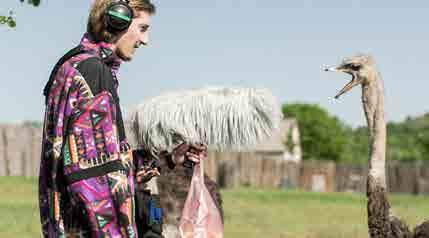
Antonio Lukich — geboren 1992 in Uschgorod, Ukraine. Er studierte Regie an der National Karpenko-Kary Universität in Kiew. Sein Abschlussfilm IT WAS SHOWERING IN MANCHESTER wurde beim IFF Odesa mit dem Preis für den besten Kurzfilm ausgezeichnet. DIE GEDANKEN SIND FREI ist sein Spielfilmdebüt, der beim Karlovy Vary 2018 den Special Jury Prize gewann. — born in 1992 in Uzhgorod, Ukraine. He studied directing at the National Karpenko-Kary University in Kiev. His graduation film IT WAS SHOWERING IN MANCHESTER was awarded the prize for best short film at the IFF Odesa. MY THOUGHTS ARE SILENT is his feature film debut, which won the Special Jury Prize at Karlovy Vary 2018. Filme WHO FRAMED KIM KUZIN? (2014, short) IT WAS SHOWERING IN MANCHESTER (2015, short) WETTBEWERB SPIELFILM
Vadim braucht Kohle. Und eine Perspektive. So klingt das Angebot, Tierstimmen für ein Videospiel aufzunehmen und anschließend vielleicht eine Jobofferte in Kanada zu bekommen, verlockend. Der Tonmeister reist von Kiew in seine Heimat Uschgorod in den Karpaten – und ausgerechnet seine anhängliche Mutter holt ihn vom Bahnhof ab. Sie lässt sich nicht abschütteln und begleitet den Sohn auf seiner Suche nach einem seltenen Vogel. Doch was ist eigentlich schlimmer: ein Verhör bei der Polizei oder ein Gespräch mit der Mutter? Filmemacher Antonio Lukich greift in seinem Spielfilmdebüt ein universelles Thema auf: das Abnabeln von der Mutter sowie die Suche nach einer Aufgabe und der eigenen Identität. Das gerät in DIE GEDANKEN SIND FREI mitunter höchst komisch. Skurrile Komödie über eine Mutter-Sohn-Beziehung, deren Stillstand auf das ganze Land abzufärben scheint – oder umgekehrt. NaF Vadim needs money, and hope for the future: thus the offer of recording animal sounds for a video game company and ultimately, perhaps, a job offer in Canada, sounds tempting. And so the sound engineer sets off from Kiev to his native Uzhgorod, located in the Carpathian mountains region, where he is met at the train station by his clingy mother. Refusing to take no for an answer, she accompanies her son on his quest for a rare bird species. En route he wonders to himself what is worse: being questioned by the police or having to answer his mother‘s questions? In his feature film debut filmmaker Antonio Lukich breaches a universal issue: the need to break free from an overbearing mother and find one‘s own place, and identity, in life. In MY THOUGHTS ARE SILENT the result is a highly amusing and, at times, bizarre comedy on a mother-son relationship, the stagnation of which appears to have rubbed off on, or alternatively been strongly influenced by, the prevailing atmosphere in the country as a whole. NaF
Filmformat / Format DCP | Farbe / colour Drehbuch / Script Antonio Lukich, Valeriya Kalchenko Kamera / Photography Ilya Egorov Ton / Sound Sergiy Stepansky Schnitt / Editing Alexander Chorny Ausstattung / Set Design Margarita Kulik Darsteller / Cast Andriy Lidagovskiy, Irma Vitovskya Produzent / Producer Alla Belaya, Dmitry Sukhanov Produktion / Production TOY CINEMA Kontakt / Contact alief. Brett Walker brett@alief.co.uk http://alief.co.uk
NÁRODNÍ TŘÍDA NATIONALSTRASSE NATIONAL STREET
ŠTĚPÁN ALTRICHTER / TSCHECHISCHE REPUBLIK, DEUTSCHLAND / CZECH REPUBLIC, GERMANY, 2019, 90 MIN
Das Leben liebt Vandam nicht, aber er liebt seine Stammkneipe und vor allem deren Besitzerin Lucka. Als er mitbekommt, dass Lucka Schulden hat und die Kneipe bald schließen muss, zieht er los in den Kampf gegen den Maklertypen, der für ihn an allem schuld ist. Eine Komödie mit Wortwitz und Tiefgang, bei der einem das Lachen immer wieder vergeht. Life doesn‘t love Vandam, he loves his local pub however and especially the owner Lucka. When he realises that Lucka has debts and will soon have to shut up shop he declares war on the estate agent who, in his eyes, is to blame for everything. A comedy full of wit and depth with a bleak undertone.
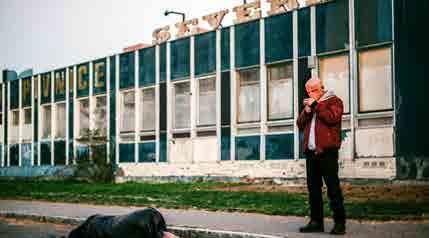
Štěpán Altrichter — geboren 1981 in Brno, heute Tschechische Republik. Er studierte Philosophie und Psychologie an der Freien Universität in Berlin. Außerdem Regie an der Filmuniversität Babelsberg „Konrad Wolf“. Zuletzt war er mit SCHMITKE beim FFC zu Gast, nun mit seinem zweiten Spielfilm NATIONALSTRAẞE. Er lebt und arbeit in Berlin. — born in 1981 in Brno, today Czech Republic. He studied philosophy and psychology at the Freie University of Berlin and directing at the Film University Babelsberg „Konrad Wolf“. Most recently he was a guest at the FFC with SCHMITKE, now with his second feature film NATIONAL STREET. He lives and works in Berlin. Filme DID MICHAEL KNIGHT END THE WAR? (2009, short, FFC 2009) ALEYNA – LITTLE MISS NEUKÖLLN (2011, doc) DUYGU (2012, doc) SCHMITKE (2014, FFC 2014) WETTBEWERB SPIELFILM
Als Hooligan von nebenan lebt Vandam in einer Plattenbausiedlung am Rande von Prag. Hier hat er schon seine Kindheit verbracht, hier ist er zu Hause. Vor allem in der Kneipe Severka, wo er von seinen Trinkkumpanen als Nationalheld gefeiert wird, weil er 1989 – zumindest behauptet er das – die Samtene Revolution losgeschlagen hat. Zuschlagen kann Vandam nämlich. Das ist seine Art, sich im Leben durchzusetzen. Aber er hat auch eine andere Seite – eine freundliche, unsichere, verletzliche. Die kommt zum Beispiel immer dann durch, wenn er sich um Lucka bemüht. Vandam ist ein zwiespältiger Held, ein Hooligan und Wutbürger, der schnell gewalttätig wird und damit die Kontrolle in seinem Kiez behält, aber auch hilflos erscheint, sobald er seine vertraute Umgebung verlässt. Die Regeln, mit denen er aufgewachsen ist, gelten heute nicht mehr. Die Welt ist viel komplexer geworden, und auch die Wertvorstellungen haben sich gewandelt. Štepán Altrichters zweiter Spielfilm, nach dem gleichnamigen Buch von Jaroslav Rudiš, ist eine treffende Mentalitätsstudie über Befindlichkeiten im dreißigsten Jahr nach dem Fall des Eisernen Vorhangs. CF A-hooligan-from-next-door kind of guy, Vandam lives in a prefabricated housing estate on the outskirts of Prague. This is where he spent his childhood, this is where he is at home, especially in the pub Severka, where he is revered by his drinking buddies as a national hero due to the fact that it was he back in 1989, or at least so he claims, who kicked off the Velvet Revolution. Vandam can talk with his fists, this is his way of asserting himself in life. But there‘s also another side to him: a friendly, insecure, vulnerable one and it‘s the latter that always comes to the fore when he attempts to win Lucka‘s affections. Vandam is an ambiguous hero, a hooligan and angry citizen who quickly becomes violent in order to maintain the upper hand in his neighbourhood, and yet also helpless as soon as he leaves his familiar surroundings. The rules with which he grew up are no longer valid today. The world has become much more complex, and values have changed as well. Štepán Altrichter‘s second feature film, based on the book of the same name by Jaroslav Rudiš, is a poignant mapping of a mindscape characteristic of this, the thirtieth year after the fall of the Iron Curtain. CF
Filmformat / Format DCP | Farbe / colour Drehbuch / Script Jaroslav Rudiš, Stepan Altrichter Kamera / Photography Cristian Pirjol Ton / Sound Ivan Horák Schnitt / Editing Jan Daňhel Musik / Music Reentko Dirks, Clemens Christian Poetzsch Ausstattung / Set Design Jan Pjen Novotný Darsteller / Cast Hynek Čermák, Jan Cina, Katerina Janecková, Václav Neuzil Produzent / Producer Pavel Strnad Produktion / Production Negativ Film Productions Co-Produktion / Co-Production 42film Kontakt / Contact 42film Claudia Hoffman hoffmann@42film.de +49 345 47 81 848 Geiststr. 49 06108 Halle (Saale) Germany
OSTRÝM NOŽOM MIT EINEM SCHARFEN MESSER BY A SHARP KNIFE
TEODOR KUHN / SLOWAKEI, TSCHECHISCHE REPUBLIK / SLOVAKIA, CZECH REPUBLIC, 2019, 90 MIN
Spannender Polit-Thriller um einen Vater, der Gerechtigkeit für seinen von Neonazis erstochenen Sohn will und einen ungleichen Kampf gegen den undurchsichtigen Justizapparat aufnimmt. Warum will kein Anwalt ihn vertreten? Was macht ein Mafia-Boss im Gerichtssaal? Woher kennt er die Angeklagten? Und die Richterin, kennt er die nicht auch? A political thriller focused on a father who fights for justice for his son, the victim of a neo-Nazi knife attack, and thus finds himself in a battle against the odds of shadowy justice system. Why is no lawyer willing to take up his cause? What is a mafia boss doing in the court room? How does he know the accused? What about the judge, does he know her as well?

Teodor Kuhn — geboren 1988 in Bratislava, heute Slowakei. Er graduierte in Regie an der Academy of Performing Arts in Bratislava. Seine Kurzfilme wurden mehrfach ausgezeichnet. MIT EINEM SCHARFEN MESSER ist sein Spielfilmdebüt. Neben dem Filmemachen engagiert er sich in der slowakischen Skatboarding Association und für digitale Bildung. — born in 1988 in Bratislava, today Slovakia. He graduated in directing at the Academy of Performing Arts in Bratislava. His short films have received several awards. BY A SHARP KNIFE is his feature film debut. In addition to filmmaking, he is involved in the Slovak Skatboarding Association and digital education. Filme LOST CHILDREN (2011, short) MOMO (2012, short) VOX POPULI (2014, short) I AM SORRY (2015, short) WETTBEWERB SPIELFILM
Der Vater war der Letzte, der seinen Sohn in der Nacht nach der Abiturfeier gesehen hat. Es gab wieder Streit, der Sohn verlässt das Haus, um Luft zu schnappen – dann ist er tot. Getrieben von unendlichen Schuldgefühlen will der Vater die Täter verurteilt sehen. Wie besessen rennt er gegen ein Geflecht aus Desinteresse, Verfahrensfehlern und mafiösen Verstrickungen an und verliert dabei mehr und mehr den Kontakt zu Frau und Tochter. Der düsteren Atmosphäre des Films entsprechen die dunklen, grau-blauen Farben und das anonyme Ambiente der riesigen 1970er-Jahre-Gebäude, in denen sich ein einzelner Mensch leicht verliert. Das Spielfilmdebüt von Teodor Kuhn ist von dem bis heute unaufgeklärten Mord an einem Studenten der Universität Bratislava im Jahre 2005 inspiriert . Um auf die Verrohung der politischen Kultur in der Slowakei aufmerksam zu machen, fand die Premiere genau ein Jahr nach der brutalen Ermordung des jungen Investigativ-Journalisten Ján Kuciak und seiner Verlobten Martina Kušnírová statt. CF His father was the last person to see him on the night on his graduation party. They argued as usual, the son leaves the house to get some fresh air and then: he is dead. Driven by a never-ending sense of guilt the father wants to see the victims brought to justice. Akin to a man possessed, he confronts a web of indifference, judicial irregularities and mafia involvement, in the process of which he becomes increasingly alienated from his wife and daughter. The dark atmosphere of the film is matched by its dark, blue and grey tones and the anonymous ambience of the huge seventies-era complex in which one can easily get lost. Inspired by the unsolved murder of a Bratislava University student back in 2005, Teodor Kuhn‘s feature film celebrated its premiere on the first anniversary of the brutal murder of up-and-coming investigative journalist Ján Kuciak and his fiancée Martina Kušnírová. CF
Filmformat / Format DCP | Farbe / colour Drehbuch / Script Jakub Medvecký, Teodor Kuhn Kamera / Photography Denisa Buranová Ton / Sound Tobias Potočný Schnitt / Editing Pavel Hrdlička Musik / Music Michal Novinski Ausstattung / Set Design Michal Lošonský Darsteller / Cast Roman Luknár, Ela Lehotská, David Hartl, Ela Štefunková, Marián Mitaš, Miroslav Krobot Produzent / Producer Jakub Viktorín Produktion / Production nutprodukcia Co-Produktion / Co-Production Radio and Television Slovakia Kontakt / Contact Wide Management Matthias Angoulvant ma@widemanagement.com +33153950464 17 rue Cadet 75009, Paris France
PUN MJESEC FULL MOON FULL MOON
NERMIN HAMZAGIĆ / BOSNIEN UND HERZEGOWINA / BOSNIA AND HERZEGOVINA, 2019, 85 MIN
Hamza ist unersetzbar. Der junge Polizist schafft es gerade noch, seine hochschwangere Frau in die Klinik zu bringen, bevor die Nachtschicht beginnt. Auf dem Revier warten die üblichen Problemfälle auf ihn. Von den Kollegen werden sie meist mit Bestechungsgeldern gelöst, doch Hamza entscheidet sich, aus dem korrupten Zirkel auszusteigen. Hamza is irreplaceable. The young policeman just about manages to deliver his heavily pregnant wife to the maternity ward before his night shift begins. At the station the usual problems await: generally his colleagues are willing to help overcome these in return for bribes, Hamza however resolves to escape the cycle of corruption.
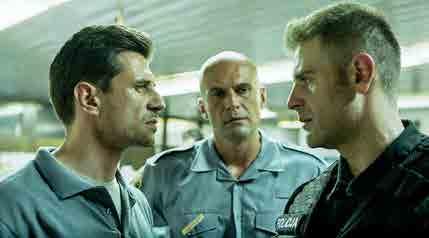
Nermin Hamzagić — geboren 1986 in Bosnien und Herzegowina. Er graduierte an der Acedemy of Performing Arts in Sarajevo, wo er als Juniorprofessor tätig ist. Neben Kurz- und Dokumentarfilmen realisierte er auch Theaterprojekte. FULL MOON ist sein Spielfilmdebüt und feiert beim 29. FFC Weltpremiere. — born in 1986 in Bosnia and Herzegovina. He graduated from the Acedemy of Performing Arts in Sarajevo, where he works as an assistant professor. In addition to short films and documentaries, he has also realised theatre projects. FULL MOON is his feature film debut and celebrates its world premiere at the 29th FFC. Filme DREAMERS (2009, doc, short) SOUL TRAIN (2015, doc) DAMAGED GOODS (2015, short) INTERVIEW (2017, short) THE ROPE (2018, doc) WETTBEWERB SPIELFILM
Die reichen Verbrecher können sich freikaufen, aber die armen … Die Zellen sind voller Gefangener, die ihre Straftaten aus Verzweiflung begangen haben: eine Minderjährige, die anschaffen geht, ein Mann, der kein Geld für die Stromrechnung hat, ein Bankräuber, der die Operation seines Kindes bezahlen muss. Diese Leute gehören hier nicht hin – das hat Hamza schon längst verstanden, aber er ist sich auch seiner Pflicht als Ordnungshüter bewusst. Wenn die gleichen Regeln nicht für alle gelten, gibt es aber keine Ordnung mehr. Zunächst gelingt es Hamza, den Spagat zwischen dem korrupten System und seinem persönlichen Mitgefühl zu meistern. Doch irgendwann muss er sich entscheiden: Entweder verletzt er seine Pflicht oder er wird selbst zum Teil des Netzwerks. Mit viel Liebe zum Detail inszeniert der junge bosnische Regisseur Nermin Hamzagić sein Spielfilmdebüt. Ihm gelingt es treffend, verkrustete Strukturen aufzuzeigen, ohne dabei in Schwarz-Weiß-Schemata zu verfallen. Hinter den Gittern gärt der Frust, im Vorraum werden die Schmiergelder verteilt. Ein verhalten sowie protokollarisch inszenierter, gleichwohl wütender Aufschrei gegen eine durch und durch nepotistische Gegenwart, die hinter der Schimäre eines solidarischen Miteinanders – bedingt durch eine verklärte Kriegsvergangenheit – blüht. JP The wealthy criminals can buy their way to freedom, the others however ... The cells are full of inmates who broke the law out of desperation: there‘s a minor who works as a prostitute, a man who can‘t afford his electricity bill and a bank robber who has to pay for his child‘s operation. They shouldn‘t be here, this is something Hamza has long understood and yet, at the same time, he is aware of his duty as a keeper of the peace. There can be no order in a society in which certain individuals are beyond the law. Initially Hamza manages to find a balance between the competing interests of a corrupt system and his own sense of empathy and yet, sooner or later, he has a choice to make between neglect of duty and becoming part of the system. Up-and-coming Bosnian director Nermin Hamzagić displays a real eye for detail in this, his feature film debut, in which he tellingly exposes outdated structures without reverting to black-and-white thinking. Whilst behind bars the frustration grows, outside the bribes are distributed. Though captured in an understated, matter-of-fact manner, the result is nevertheless an angry outcry against an age of utter nepotism that, behind a facade of solidarity resulting from a romanticised view of the wartime past, continues to flourish. JP
Drehbuch / Script Nermin Hamzagic, Emina Omerovic Kamera / Photography Amel Đikoli Ton / Sound Igor Camo Schnitt / Editing Redzinald Simek Musik / Music Enes Zlatar Ausstattung / Set Design Vanja Miholjcic Darsteller / Cast Alban Ukaj, Ermin Sijamija, Izudin Bajrović, Mediha Musliović, Muhamed Hadžović, Lidija Kordić, Jasna Diklić, Mirela Lambić, Boris Ler, Alena Džebo, Sanja Burić, Ahmed Nuhić, Faketa Avdibegović, Mugdim Avdibegović, Kemal Rizvanović, Lazar Dragojević, Irfan Ribić, Admir Šehović, Martina Mandek, Dražen Pavlović, Edin Avdagić Produzent / Producer Amra Bakšić Čamo, Adis Đapo Produktion / Production SCCA/pro.ba Nedzada Musica 4 71000, Sarajevo +387 60 33 54 824 www.pro.ba Co-Produktion / Co-Production BHRT Kontakt / Contact SCCA/pro.ba Ida Makarevic
REŽI LOVE CUTS LOVE CUTS
KOSTA ĐORĐEVIĆ / SERBIEN, KROATIEN / SERBIA, CROATIA, 2019, 80 MIN
Aja auf Adrenalin. Die Teenagerin steht unter Druck: drinnen sturmfreie Bude, draußen die Hundstage. Die Mutter ruft andauernd an und nervt, ihr Freund hat keine Lust mehr auf sie, im Kiez sind rivalisierende Banden unterwegs. Man schreit sich an, man trennt sich. Aggressionen liegen in der Luft. Energiegeladenes Independent-Sommerportrait aus Belgrad. Aja on adrenalin. Have the flat to herself though she might, outside the dog days of summer are in full swing. A teenager under pressure, her mother constantly calls, her boyfriend is losing interest and rival gangs wander the neighbourhood streets. They shout and get caught up in conflicts, and thus aggression is in the air in this high-energy, independently made summer portrait from Belgrade.
Wenn der Asphalt glüht, ist es eigentlich nur im Schwimmbad auszuhalten. Ajas Mutter fragt trotzdem alle zwei Stunden nach, ob sie in der Bibliothek sitzt und lernt. Das ist allerdings nur das kleinere Problem. Ihr Freund geht einfach nicht ans Handy. Als Aja realisiert, dass ihre Beziehung bereits in Scherben liegt, brennt ihr die Sicherung durch. Eine Provokation auf der Straße endet mit einem Messerstich, der Ruf nach Rache wird laut … Temporeiche und authentisch inszenierte Low-Budget-Produktion, die vor allem von der beeindruckenden Hauptdarstellerin getragen wird. Ständig zwischen emotionalen Auf und Abs pendelnd, wütet sie sich durch die kongenial inszenierten Stadtlandschaften Belgrads. Kosta Đorđević zweiter Spielfilm zeigt eine Gesellschaft, die mit dem Verstand nicht zu begreifen ist – und in der nur der durchzukommen glaubt, der am lautesten schreit. RH & BB
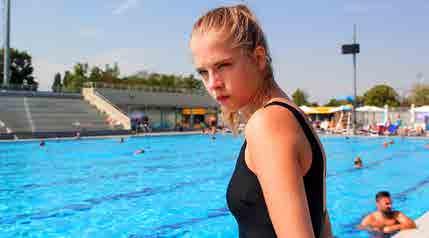
When the asphalt starts to smoulder, the only place to find relief is the swimming pool, and yet Aja’s mother continues to call every other hour to check if she is studying at the library. This is the least of her worries however: her boyfriend refuses to answer her calls, and when Aja finally comes to realise that their relationship is in tatters, she flies into an uncontrollable rage. A provocation on the streets sees her become the victim of a knife attack, after which she starts to toy with the thought of revenge … This fast-moving and authentically captured low-budget production owes a large part of its success to the impressive leading actress, who tears across the charmingly-captured urban landscape of Belgrade through the emotional highs and lows. Kosta Đorđević’s second feature-length film portrays a stratum of society that cannot be grasped by reason alone and in which only those who shout loudest are destined to succeed. RH & BB
Kosta Đorđević — geboren 1981 in Belgrad, heute Serbien. Er studierte Film- und Fernsehregie an der Faculty of Dramatic Arts in Belgrad. Seitdem realisierte er mehrere Kurz-, Spiel- und Dokumentarfilme. LOVE CUTS ist sein zweiter Spielfilm, ein dritter ist bereits in Arbeit. Seit 2010 leitet er die Produktionsfirma Kinematorgrafska kuća. — born in 1981 in Belgrade, today Serbia. He studied film and television directing at the Faculty of Dramatic Arts in Belgrade. Since then he has made several short films, feature films and documentaries. LOVE CUTS is his second feature film, a third is already in progress. Since 2010 he has been running the production company Kinematorgrafska kuća. Filme STREET WALKER (2004, short) INVASION (2005, doc) PASSAGE (2008, short) TROLLING (2013) WETTBEWERB SPIELFILM
Filmformat / Format DCP | Farbe / colour Drehbuch / Script Dragan Nikolic Kamera / Photography Bojana Andric Ton / Sound Mićun Jauković, Dako Puač Schnitt / Editing Romana Vujasinović Musik / Music Filip Mitrović Ausstattung / Set Design Damjan Paranosić Darsteller / Cast Kristina Jovanović, Đurđina Radić, Mladen Sovilj, Marko Janketić, Milan Čučilović Produzent / Producer Milos Ivanovic Produktion / Production Kinematografska kuća Co-Produktion / Co-Production Marinis Media Kontakt / Contact Soul Food Tijana Visnjic Majke Jevrosime 39 11 000 Belgrade Serbia tijana.visnjic@sulfoodfilms.com +381 11 2672 004 +381631061162
SESTRA SCHWESTER SISTER
SVETLA TSOTSORKOVA / BULGARIEN, KATAR / BULGARIA, QATAR, 2019, 98 MIN
Ihre gesamte Familie wäre von der Mafia brutal ermordet worden, als sie noch ein Kind war. Ihre Mutter hätte sie verlassen, weshalb sie im Heim aufwachsen musste. Zumindest erzählt Rayna solche Geschichten den Kunden, die ihre Tonfiguren kaufen. Sie ist ein wahres Naturtalent – was das Erfinden ihres eigenen Familienschicksals angeht. Ein Talent, das ihr später zum Verhängnis wird Her family was brutally murdered by the mafia when she was a child. Her mother abandoned her and consequently she grew up in an orphanage. At least these are the kinds of stories Rayna tells the potential purchasers of her clay figurines. She really has a gift, at least when it comes to making up stories about the fate of her family. A gift that later proves her undoing.
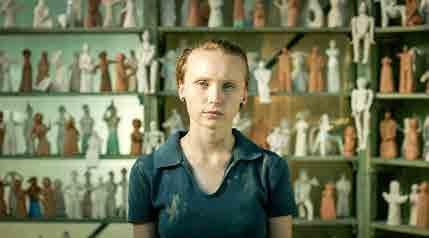
Svetla Tsotsorkova — geboren 1977 in Burgas, Bulgarien. Schauspielerin, Produzentin, Regisseurin. Sie studierte an der National Academy for Theatre and Film Arts in Sofia. Mit ihrem Diplomfilm LEBEN MIT SOFIA, für den sie mehrfach international ausgezeichnet wurde, war sie 2005 beim FFC zu Gast. Dieses Jahr ist sie mit ihrem zweiten Spielfilm SCHWESTER zu sehen. — born in 1977 in Burgas, Bulgaria. Actress, producer, director. She studied at the National Academy for Theatre and Film Arts in Sofia. With her diploma film LIFE WITH SOFIA, for which she received several international awards, she was a guest at the FFC in 2005. This year her second feature film SISTER can be seen. Filme BRIGHTON (2002, short) LIFE WITH SOFIA (2004, short) MAIKA ME (2005, short) THIRST (2015) WETTBEWERB SPIELFILM
In Wirklichkeit lebt Rayna gemeinsam mit ihrer Mutter und der großen Schwester in einem Haus an einer vielbefahrenen Landstraße in der bulgarischen Provinz. Alle drei sind wohlauf, nur was mit ihrem Vater geschehen ist, weiß sie nicht. Man erzählt, dass ihre Mutter früher viele Männer hatte. Rayna schaut mit einer Mischung aus Neid und Bewunderung auf ihre große Schwester, denn die hatte mehr Glück als sie: Ihr Name, Kamelia, ist schöner, und sie hat auch einen Freund: den Automechaniker Miro. In den ist Rayna ebenfalls verliebt, zumindest neckt sie den machohaften Nachbarn. Wegen ihrer Lügengeschichten und Frechheiten wird sie von ihrer großen Schwester als bösartig und verrückt beschimpft, oft eskaliert der Streit zwischen den beiden. Als Miro in Schwierigkeiten gerät, ist Rayna die einzige, die ihm zur Hilfe eilt. Dabei erfährt sie einiges über ihre Mutter, was lieber ungesagt geblieben wäre. Svetla Tsotsorkova formt den Plot ihres zweiten Spielfilms gekonnt und geduldig – wie eine von Raynas Tonfiguren. SCHWESTER besticht durch eine eindrucksvolle Bildsprache, die dieses filmische Frauenportrait noch sehenswerter macht. JP In reality Rayna lives together with her mother and older sister in a house by a busy countryside highway in provincial Bulgaria. They‘re in fact all alive and well, with only the fate of the sisters‘ father an unknown. It‘s said her mother used to have many lovers. Rayna looks at her sister with a mixture of envy and admiration, after all fate has been kinder to her: her name, Kamelia, is more beautiful, and then she has a boyfriend, the macho neighbour and car mechanic Miro. Rayna is likewise smitten, as evidenced by her constant teasing of him. Cursed by her older sister, who regards her as both malicious and somewhat deranged due to her impudence and lies, arguments between the two often escalate out of control. When Miro ends up in trouble Rayna proves to be the only person who rushes to his aid. In the process she finds out truths about her mother that would have been better left unsaid. Svetla Tsotsorkova shapes the plot of this, her second feature film, with great skill and patience, in a manner akin to Rayna‘s approach to her figurines. SISTER stands out with an impressive visual language, in turn making this female portrait all the more worth watching. JP
Filmformat / Format DCP | Farbe / colour Drehbuch / Script Svetoslav Ovcharov, Svetla Tsotsorkova Kamera / Photography Vesselin Hristov Ton / Sound Valeria Popova Schnitt / Editing Svetla Tsotsorkova Musik / Music Hristo Namliev Ausstattung / Set Design Mira Kalanova Darsteller / Cast Monika Naydenova, Svetlana Yancheva, Elena Zamyarkova, Assen Blatechky Produzent / Producer Svetoslav Ovcharov Produktion / Production OMEGA FILM Kontakt / Contact FILM REPUBLIC VIKTORIJA COOK Hackney Picturehouse, 270 Mare Street London UK VIKTORIJA@FILMREPUBLIC.BIZ +37064795414
SHPIA E AGËS AGAS HAUS AGA‘S HOUSE
LENDITA ZEQIRAJ / KOSOVO, KROATIEN, FRANKREICH, ALBANIEN / KOSOVO, CROATIA, FRANCE, ALBANIA, 2019, 107 MIN
Die Wunden des Kosovo-Konflikts heilen nicht, denn neben den Toten gibt es zahlreiche lebende Opfer. Doch in einer patriarchalen Gesellschaft finden die Schicksale von Frauen und Kindern selten Gehör, geschweige denn ihre Sehnsüchte. Und während die einen nach Liebe und Geborgenheit suchen, hinterfragen andere ihre komplette Identität The wounds of the Kosovo conflict refuse to heal, not least since in addition to the dead there are numerous living victims. In a patriarchal society the fates of women and children, let alone their hopes and desires, are rarely heard however. And while some are looking for love and security, others question their identity as a whole.
Ein paar Frauen leben irgendwo in der Einöde, abgeschnitten von der Welt – und vor allem von männlichem Einfluss. Nur der neunjährige Aga, Sohn von Kumria, lebt bei ihnen. Die Männer sind im Krieg gestorben, ausgewandert oder der Zutritt ist ihnen schlicht nicht erlaubt. Unter den Frauen wird getratscht, gequatscht, geraucht und gestritten. Doch was tatsächlich in ihrem bisherigen Leben vorgefallen ist, das wird erst nach und nach enthüllt. Ausgelöst durch den Selbstmordversuch einer Mitbewohnerin und ein Interview mit ausländischen Journalisten wird schließlich die Tragik der Lebensläufe offenbart. Aga – als einziger Mann im Haus – ist in diesem Ensemblefilm der Außenseiter: eine Minderheit in der Minderheit. Die kosovarische Filmemacherin Lendita Zeqiraj widmet auch ihren ersten Langspielfilm den vermeintlich schwächeren Mitgliedern der Gesellschaft: Frauen und Kindern. Während erstere in der durch Krieg und Migration erzwungenen Abwesenheit der Männer den Mut aufbringen, über ihre unterschiedlichen Erlebnisse, Ängste und Wünsche zu sprechen, empfindet Aga hingegen eine Lücke. Dem Jungen fehlt eine Vaterfigur, die er abseits des Hauses mit aller Macht zu finden versucht. NaF
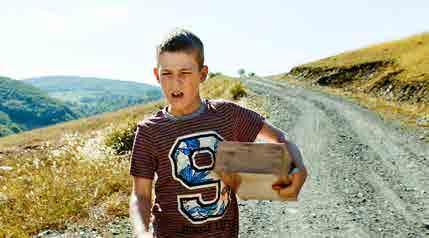
A handful of women live in solitude, cut off from the world and, above all, male influence. Only nine-year-old Aga, son of Kumria, lives with them. The men have died in war, migrated to other countries or they are just not allowed to entrance the house. The women gossip, chat, smoke and quarrel. And yet, what actually happened in the past, that is only gradually revealed. Triggered by a roommate’s attempted suicide and an interview with foreign journalists the tragedies of the past finally come to light. Aga, as the only man in the house, is in this multi-protagonist film the outsider: a minority within a minority. Kosovar filmmaker Lendita Zeqiraj, the recipient of numerous awards for her short films FENCE and BALCONY, also dedicates her first feature film to the supposedly weaker members of society: women and children. While the former, in the absence of men forced upon them by war and migration, display the courage to talk about their experiences, fears and desires, Aga experiences a void. The boy lacks a father figure and leaves no stone unturned in his search for one beyond the four walls of home. NaF
Lendita Zeqiraj — geboren 1972 in Priština, Kosovo. Sie studierte Bildende Kunst in Priština. Während der Konflikte im Kosovo geht sie nach Paris, wo sie Film studiert. Ihre Kurz- und Dokumentarfilme wurden zu zahlreichen, internationalen Filmfestivals, u.a. Oberhausen, Vilnius, Triest, eingeladen und mehrfach ausgezeichnet. AGAS HAUS ist ihr Spielfilmdebüt und feierte beim diesjährigen Karlovy Vary Weltpremiere. — born in 1972 in Priština, Kosovo. She studied fine arts in Priština. During the conflicts in Kosovo she went to Paris where she studied film. Her short and documentary films have been invited to numerous international film festivals, including Oberhausen, Vilnius and Trieste, and have received several awards. AGA’S HOUSE is her feature film debut and celebrated its world premiere at this year‘s Karlovy Vary. Filme EXIT (2003, short) ALBANIAN, EGYPTIAN (2010, short, doc) WE’RE NOT IN PARADISE (2011, short, doc) BALCONY (2013, short) FENCE (2018, short) WETTBEWERB SPIELFILM
Filmformat / Format DCP | Farbe / colour Drehbuch / Script Lendita Zeqiraj Kamera / Photography Sofian El Fani Ton / Sound Nicolas Mas, Pellumb Ballata, Jean-Barthelemy Velay, Aymeric Dupas Schnitt / Editing Keka Berisha, Thomas Marchand Ausstattung / Set Design Lendita Zeqiraj, Burime Arifi Darsteller / Cast Arti Lokaj, Rozafa Celaj, Adriana Matoshi, Basri Lushtaku, Shengyl Ismaili, Melihate Qena, Rebeka Qena Produzent / Producer Bujar Kabashi Produktion / Production N‘ART FILMS Co-Produktion / Co-Production WOOF FILMS, SKA-NDAL, SACREBLEU Production, SY13 Kontakt / Contact N‘ART FILMS Bujar Kabashi bujar.kabashi@gmail.com +38349200408 nartstudio.com Zenel Salihu 26, 10000 Prishtina, Kosovo
TOPAL ŞÜKRAN‘IN MACERALARI DIE ABENTEUER VON SUKRAN DER LAHMEN THE ADVENTURES OF SUKRAN THE LAME
ONUR ÜNLÜ / TÜRKEI / TURKEY, 2019, 80 MIN
Sukrans Geschichte beginnt mit einem Unfall, und nun muss sie ihr noch junges Leben mit einem steifen Bein meistern. Doch davon lässt sie sich nicht unterkriegen, träumt von Liebe, körperlicher Nähe und Geborgenheit. Aber immer wieder steht ihr etwas im Weg. Oder jemand kommt ihr in die Quere. Sukran‘s story begins with an accident, and now she will have to master her still young life with a stiff leg. But she doesn‘t let this get her down, dreaming of love, physical closeness and a feeling of security. However, something is constantly getting in her way. Or someone is standing in her way.

Onur Ünlü — geboren 1973 in Ízmit, Türkei. Er ist Regisseur, Produzent und Schauspieler, aber vor allem bekannt als Drehbuchautor. Seine Filme und Drehbücher wurden mehrfach ausgezeichnet, u.a. beim Istanbul International Film Festival und beim Antalya Golden Orange Film Festival. — born in 1973 in Izmit, Turkey. He is a director, producer and actor, but is best known as a screenwriter. His films and screenplays have received numerous awards, among others at the Istanbul International Film Festival and the Antalya Golden Orange Film Festival. Filme POLICE (2007) FIVE CITIES (2009) THE EXTREM TRAGIC STORY OF CELAL TAN AND HIS FAMILY (2011) LEYLA AND MECNUN (2011–14, TV series) LET’S SIN (2014) WETTBEWERB SPIELFILM
Sie hat immer Pech. Doch nicht nur das: Jedem, der ihr zu nah kommt, passiert ein Unglück – manchmal auch tödlich. Mitunter sieht sie es voraus, zuweilen hilft sie ein wenig nach. Auf dem Weg zum Glück gibt es für sie keine Hürden. Wird sie finden, wonach sie sucht? Als knallbuntes Stummfilm-Märchen inszenierte Coming-of-Age-Geschichte, frech und subversiv, zugleich sarkastisch und morbide. Dem Film gelingt ein virtuoses Spiel mit Licht und Schatten, mit Nähe und Tiefe und mit einer Geräuschkulisse, die einige Ereignisse vorausahnen lässt und doch immer wieder mit den Zuschauererwartungen bricht. JP She is always unlucky. But that‘s not all: anyone getting too close to her has an accident - sometimes a fatal one. At times, she foresees the misfortune, and then there are other times when she has a hand in making it happen. There are no hurdles for her on the way to happiness. Will she find what she is looking for? A coming-of-age story staged as a brightly coloured fairytale without dialogue, cheeky and subversive, yet sarcastic and morbid at the same time. The film succeeds in delivering a virtuoso handling of light and shadow, intimacy and depth, and a soundscape that foreshadows some events and yet constantly breaks with the audience‘s expectations. JP
Filmformat / Format HD CAM | Farbe / colour Drehbuch / Script Onur Ünlü Kamera / Photography Vedat Özdemir Ton / Sound Mustafa Bölükbaşı Schnitt / Editing Ayris Alptekin Ausstattung / Set Design Çağrı Aydın Darsteller / Cast Demet Evgar, Serhat Kılıç, Ayşe Melike Çerçi, Halil Babür, Bora Akkaş Produzent / Producer Tanay Abbasoğlu, Murat Özgüllü Produktion / Production TN Yapim Kontakt / Contact sukranthelame@gmail.com








